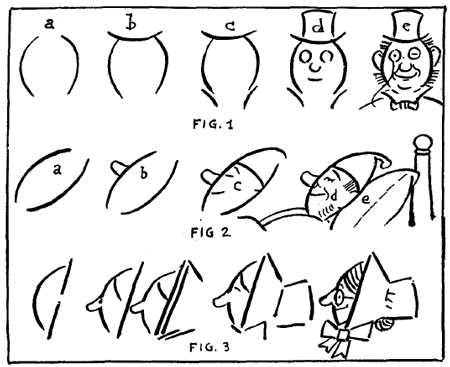Home > Directory of Drawing Lessons > How to Improve Your Drawings > Drawing Exercises > Drawing Exercises to Increate Creativity and Imagination for Kids and Beginners
DRAWING EXERCISES TO INCREASE CREATIVITY & IMAGINATION : Here are Some illustration exercises that help you Use both sides of your brain
|
|
Drawing Exercises to Make You More Creative and ImaginativeThe Progression of a Drawing ... Step by Step
In this drawing exercise, the progression of a drawing is shown above in a step by step method, and lettered A, B, C, D and E in Figure 1 ... These drawings are not intended as separate drawings but as a step by step format. A is the start, B the next step, and so on until the completion E. In Figure 2, the lines in A are partly repeated in the final drawing D E. The examples above are given to show how the drawings. These are to be drawing in the order we show them above. These are only suggestions for you to draw, but they are pretty easy to follow and fun to draw.
Incentive to Be Creative and ImaginativeIn this interesting drawing exercise (shown in Figures 5 and 6) the curves on which the subjects below are based are shown in heavy lines as keys to characters illustrated below. As the exercise is intended as an incentive to the display of creativity and imagination, so accuracy in duplicating these curves isn't importrant...just the action of trying is important.
Further Advanced Drawing Exercises to TryThe following drawing exercises are similar to Figures 5 and 6, but they are harder to duplicate. Draw any desired curves and angles and then try to draw people and other figures based on these lines. Trying to make them funny is a fun way to make this drawing exercise more exciting.
Circle Drawing ExercisesNow draw several circles and curved shapes and then turn them into characters or objects in a composition of a figure or object. The examples belw in Figure 10 will help show you understand that you can draw anything that you put your mind to.
In a drawing that creates eye-candy effect (like to look at it), much is left to the suggestion and to the imagination of the viewer looking at the drawing. For example, in drawing the stones in a stone wall it is only necessary, as a usual thing, to suggest a few of the stones. You don't need to draw every detail or ever stone to make the viewer understand what they are looking at. Also, you only have to draw a few bricks in a brick house to show that it is a brick house. A few leaves, sometimes, in the foreground of a drawing contain all the detail of that sort that is required to indicate the foreground foliage. In your drawings, we can suggest things, some of which have neither form, quality, visible appearance, or in fact, any physical manifestation whatsoever. By means of drawing lines, aided by association of ideas, we are able to symbolize the intangible. In time the symbolic definition of an object becomes as familiar, or nearly so, as the material meaning. Thus, the anchor is the symbol of Hope; the key of Knowledge; the owl of Wisdom. Here are a few symbolic objects that make good subjects for school room exercises:Learning represented by the lamp. Bondage, represented by shackles. Time, represented by the hour glass. Peace, represented by the olive branch. Justice, represented by scales or sword, or both together. Dove, peace. Dog (bull), watchfulness. Mule, stubbornness. Lion, royalty and dignity. Eagle, domination. |
Privacy Policy ...... Contact Us












